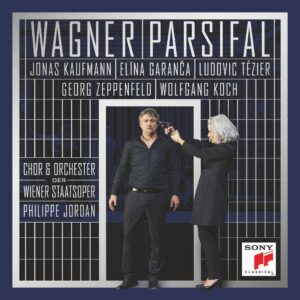
CD Review: Sony Classical’s ‘Parsifal’
By Bob DieschburgThe CD release of “Parsifal” under Philippe Jordan is not exactly news. The production dates from the 2021 season of the Vienna State Opera when the gritty, and no less controversial, staging of Kirill Serebrennikov received widespread attention.
It was a secular “Parsifal,” highly politicized, and more akin to the oppressive climate of the Soviet Gulag than the Romantic exclusivity of Montsalvat. After all, Serebrennikov had removed any trace of the ethereal in one bold – one might say blasphemous – sweep, turning the repository of the sacrosanct into nothing but the plainest delivery package!
In light of the above, it seems only natural that Sony has opted not to revive the visual capharnaum of the staging, no matter one’s personal inclinations. Instead, Wagnerians will have the chance to solely focus on the music and the album’s stellar cast of soloists. Their performance may at times be exceptional; yet holistically the new “Parsifal” is not an unmitigated success.
The Vocal Patina of Parsifal
Jonas Kaufmann and Georg Zeppenfeld have an undeniably impressive track record as so-called singing actors in the Wagner repertory.
The German tenor even has under his belt a DVD release of “Parsifal” from 2013 when he was at the very height of his vocal abilities. It comes as no surprise that in the intervening years the levelness of his voice has waned, the tone became coarser, and the general gist moved away from the Romantic shine of Lohengrin to the wear and tear of Peter Grimes.
That is not to say Kaufmann does not sing beautifully. His line has retained all its expressiveness and the top rings securely on command. But Kaufmann’s “reiner Tor” has matured beyond the naivety which so defines the protagonist in the first act.
His Parsifal is a tormented hero whose vocal physiognomy comes to full fruition only towards the end; in Act three, his exquisitely dark, slightly weathered tone assumes the physique du rôle, so to speak, when after his wanderings the aged knight returns to the castle of the Grail.
Examples of his interpretive sophistication are manifold. In “Amfortas, die Wunde” the range of chromatic nuance is commendable. It pairs with great dynamic variation and the German’s expressive phrasing, for instance, in the staccato line of “Es starrt der Blick dumpf auf das Heilsgefäss.” In the renditions of Kollo and Domingo, the latter is infused with a sense of Romantic agony, heroic and full of awe. Kaufmann, on the other hand, lends it some decidedly tortured inflections which are characteristic of his Parsifal throughout.
Gurnemanz and Kundry, Multifaceted
Zeppenfeld, in the role of Gurnemanz, ticks every box. More than Kaufmann, he delivers an all-encompassing portrait of the elderly knight which is second only to the incomparable Kurt Moll’s. It is rich in psychological nuance thanks mostly to the clarity of his diction which gives flavor even to the score’s most lengthy parts, like the Gurnemanz’ exposition in Act one.
At his side he has the lushly timbered Kundry of the Latvian Elina Garanča who steps into her debut role with stirring aplomb, both vocally and interpretively. Garanča puts on display prismatic brilliance which confers upon her character an uncanny luster, not to mention versatility.
The forward-thrust of her interpretation delineates a multitude of facets: from Kundry’s treachery and intense suffering to the proactivity which imbues her vocal acting. Yet despite its novelty, it is hard not to regret the occasional polish which would have hoisted her portrayal into the stratosphere of Kundrys. For example, in a tour de force like “Ich sah das Kind an seiner Mutter Brust” the phrasing lacks the willfulness of Christa Ludwig and the relish of Jessye Norman; all the while some of her idiosyncrasies relate to what the current reviewer perceives as a slight reticence to produce a full-fledged chest voice.
The French Ludovic Tézier, like Elina Garanča, makes an imposing debut in the part of Amfortas. Though his line retains an Italianate feel it is no mean feat to see his warmly timbered, honeyed baritone adapt to the vocal writing of Wagner. Indeed, his emphasis on textual meaning seamlessly blends with the deictic skills of the native speakers including Wolfgang Koch whose grainy Titurel is a fitting vocal antagonist.
Pacing Ahead
The bone of contention, if any there is, rests on the tempi of conductor Philippe Jordan. They are swift and follow a musicological pattern which puts “Parsifal” into the historical context of performance practices much faster than what Knappertsbusch or Karajan have preached since the end of WWII.
Jordan dramatizes the action while at the same time demystifying some of its quasi-religious allure. This may be for better or for worse. On the one hand, “Parsifal” returns to being stage action as opposed to a “Bühnenweihfestspiel” which has become the equivalent of a religious mantra. The orchestra of the Vienna State Opera leans into this revamp which, incidentally, turns out less brass-heavy than some of its earlier competitors.
On the other hand, it seems to who currently writes that Jordan does not embed “Parsifal” into a vision of his own. There is little to compensate for the loss of its liturgical grandeur; instead, it seeks a middle path which lies somewhere between the prosaic radicality of Pierre Boulez (by far the shortest “Parsifal” to date) and soundscape artists like James Levine.
Yet others have been more successful and while a welcome addition to the catalog, Philippe Jordan’s “Parsifal” may claim longevity based on the merits of its singers more than on its impact overall.


